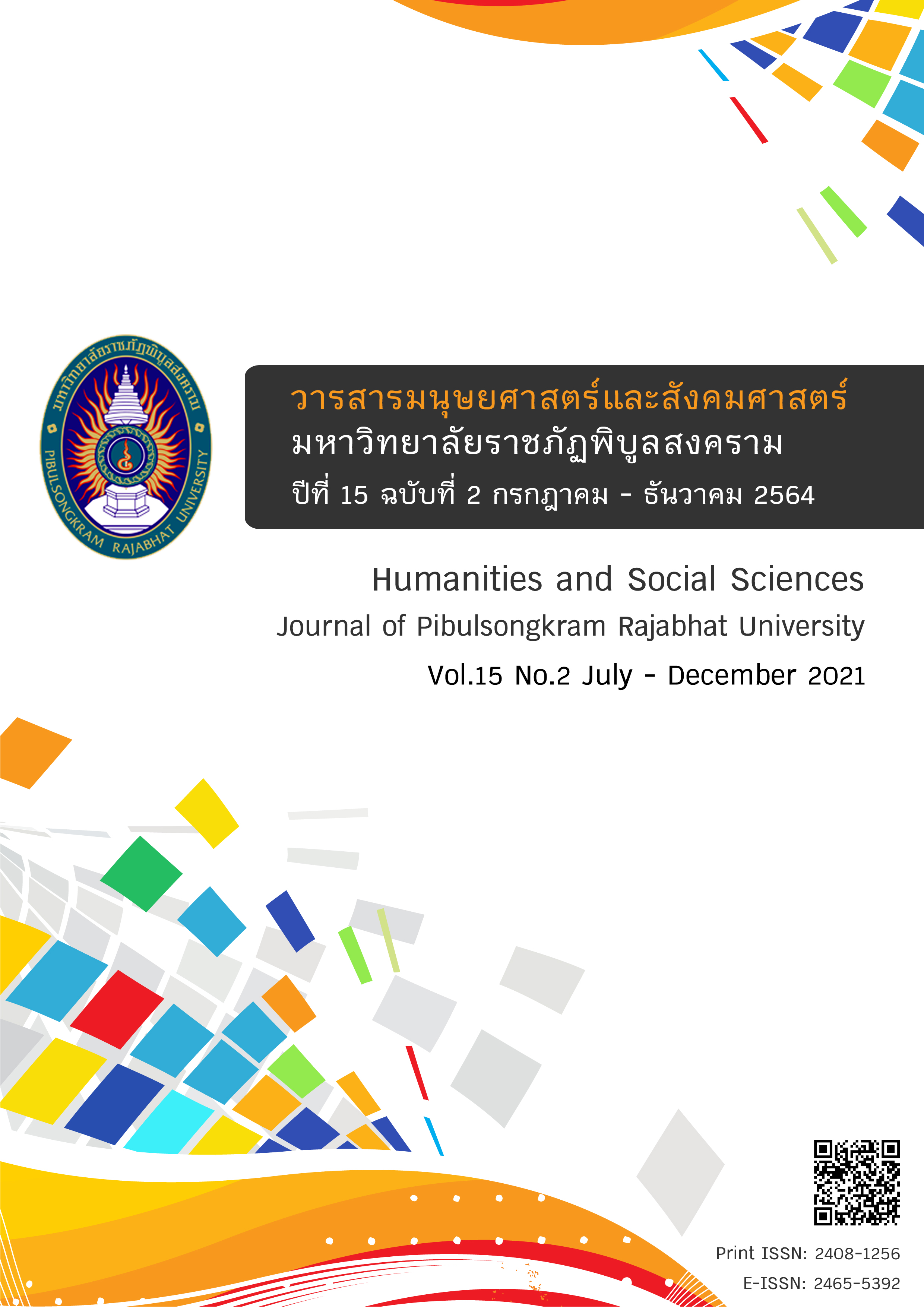The Effect of Using Group Dynamics on Analytical Thinking of Thai Language Students in Social Literature Course
DOI:
https://doi.org/10.14456/psruhss.2021.23Keywords:
Critical thinking skills, Group dynamics, Social literature courseAbstract
This research is an experimental research. The objectives of this research are 1) to study the effect of the group dynamics on the critical thinking skills of the Thai major students in Social Literature Course; 2) to study group behavior of Thai language students from using group dynamics method in Social Literature Course; 3) and to study the satisfaction levels of the Thai major students in Social Literature Course. The samples were the second-year Thai major students of semester 1/2018 from Faculty of Education, Naresuan University. There were 68 students, and are divided into two groups: the first group consists of 32 students, and the second group 36 students. The research tools are the group dynamics teaching plans, the group observation forms, and the satisfaction with group dynamics questionnaires. The data analysis is based on statistics methods: frequency (f), percentage (%), mean ( ), standard deviation (S.D.), and t-test dependent. The result of the research is that the critical thinking skills of the sample students have improved after the application of group dynamics in Social Literature Course with the statistical significance of .01 The level of the group behavior of the students after the application of group dynamics method is quite high (
= 2.57) (S.D. = 0.41), Have the analytical thinking scores after using group processes of up to 77.78 percent., and the students have a good satisfaction with the group dynamics (
= 4.30) (S.D. = 0.58)
References
เกรียงศักดิ์ เจริญวงศ์ศักดิ์. (2546). การคิดเชิงบูรณาการ. กรุงเทพฯ: ซัคเซส มีเดีย.
ทรงภพ ขุนมธุรส. (2561). เอกสารประกอบการสอนรายวิชา 208232 วรรณกรรมกับสังคม. พิษณุโลก: คณะศึกษาศาสตร์ มหาวิทยาลัยนเรศวร.
ทิศนา แขมมณี. (2558). ศาสตร์การสอน : องค์ความรู้เพื่อการจัดกระบวนการเรียนรู้ที่มีประสิทธิภาพ (พิมพ์ครั้งที่ 19). กรุงเทพฯ: จุฬาลงกรณ์มหาวิทยาลัย.
นันทวรรณ แก้วโชติ. (2560). เอกสารการจัดการเรียนรู้ (Learning Management). สงขลา: คณะครุศาสตร์มหาวิทยาลัยราชภัฏสงขลา.
พิมพันธ์ เดชะคุปต์. (2554). ทักษะ 5C เพื่อการเรียนรู้และการจัดการเรียนการสอนแบบบูรณาการ (พิมพ์ครั้งที่ 6). กรุงเทพฯ: จุฬาลงกรณ์มหาวิทยาลัย.
รัตนา พรมภาพ. (2551). ความพึงพอใจของนิสิตที่มีต่อการจัดการเรียนการสอนในหลักสูตรของภาควิชาการศึกษา คณะศึกษาศาสตร์ มหาวิทยาลัยนเรศวร ปีการศึกษา 2550. พิษณุโลก: ภาควิชาการศึกษา คณะศึกษาศาสตร์ มหาวิทยาลัยนเรศวร.
สุชาดา ปิติพร. (2559). การพัฒนาการคิดวิเคราะห์ในวิชาภาษาไทย (สาระที่ 5 วรรณคดีวรรณกรรม) โดยใช้กระบวนการกลุ่ม (วิทยานิพนธ์ปริญญามหาบัณฑิต). กรุงเทพฯ: มหาวิทยาลัยธุรกิจบัณฑิตย์.
สุรชัย ธรรมทวีธิกุล, และญาณพินิจ วชิรสุรงค์. (2559). แนววิธีการพยากรณ์พฤติกรรมของมนุษย์ใน “พลวัตกลุ่ม” (Group Dynamics) ของ Kurt Lewin แห่ง M.I.T. วารสารวิชาการมหาวิทยาลัยธนบุรี, 10(23), 111-118.
สุวิทย์ มูลคำ. (2547). กลยุทธ์การสอนคิดวิเคราะห์ (พิมพ์ครั้งที่ 2). กรุงเทพฯ: ภาพพิมพ์.
อาร์ม โพธิ์พัฒน์. (2550). การศึกษาผลสัมฤทธิ์ทางวิทยาศาสตร์และความสามารถวิเคราะห์ของนักเรียนชั้นมัธยมศึกษาปีที่ 3 ที่ได้รับการสอนโดยใช้ชุดกิจกรรมเขียนแผนผังมโนมติ (สารนิพนธ์ปริญญามหาบัณฑิต). กรุงเทพฯ: มหาวิทยาลัยศรีนครินทรวิโรฒ.
อุษา ไชยชนะ. (2550). ผลการใช้วิธีสอนแบบกระบวนการกลุ่มสัมพันธ์ที่มีต่อทักษะชีวิตและผลสัมฤทธิ์ทางการเรียนในกลุ่มสาระการเรียนรู้สังคมศึกษา ศาสนาและวัฒนธรรม ของนักเรียนชั้นมัธยมศึกษาปีที่ 1 โรงเรียนหาดใหญ่วิทยาลัยสมบูรณ์กุลกันยา จังหวัดสงขลา (วิทยานิพนธ์ปริญญามหาบัณฑิต). สงขลา: มหาวิทยาลัยทักษิณ.
Downloads
Published
How to Cite
Issue
Section
License
Any articles or comments appearing in the Journal of Humanities and Social Sciences, Rajabhat Phibulsongkram University, are the intellectual property of the authors, and do not necessarily reflect the views of the editorial board. Published articles are copyrighted by the Journal of Humanities and Social Sciences, Rajabhat Phibulsongkram University.









